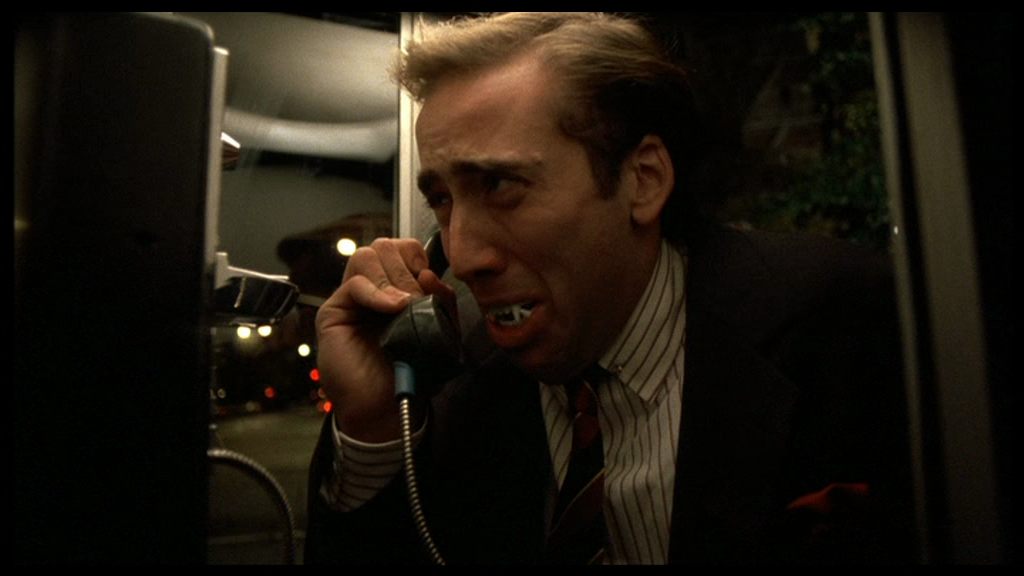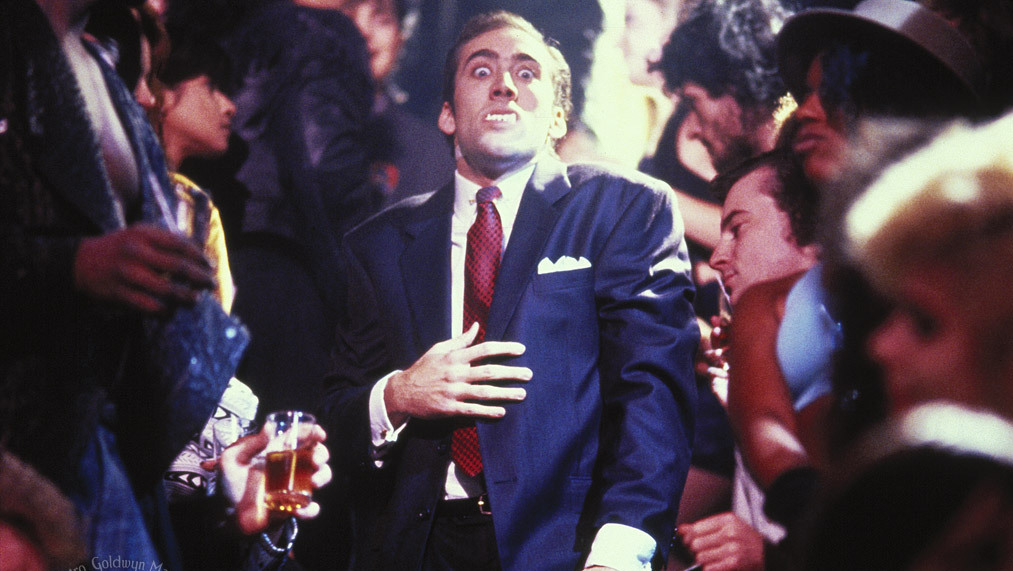It seems like YouTube was as responsible for salvaging Nicolas Cage’s reputation in the 2000s as Adaptation was; while the latter reminded audiences of née-Coppola’s (relatively) serious acting chops, the former proved a utile platform for projecting fan-made sizzle reels of Cage’s best freakouts to mass audiences. The video “Nicolas Cage Losing His Shit” spread like wildfire on Facebook when it was uploaded to the Tube by Harry Hanrahan in 2010 (since removed and re-uploaded by someone else in 2013)—we all recognized clips from films like Leaving Las Vegas, Ghost Rider, and Face/Off, but the bulk of the video was unfamiliar. Had anybody actually seen The Wicker Man at this point? Had anybody ever even heard of Zandalee?
Without a doubt the two standouts from this dramatic montage—a film in itself with its backing score of “Lux Aeterna”—were Nic’s brother Christopher Coppola’s 1993 directorial debut Deadfall and a 1989 black comedy (…?) called Vampire’s Kiss. Spoiler alert—Deadfall falls apart about halfway through its runtime when Cage and his baffling mustache/hairpiece/accent falls victim to a grotesque murder. In fact, one could trace the lineage of Cagesploitation pictures back to this unbelievably un-Coppola-like crime drama, which unsurprisingly features Cage’s minor character prominently in all of its marketing materials, as it clearly had nothing else working for it.
Vampire’s Kiss, on the other hand, ushered in a very different classification of Cage film, a category of movies which seem totally batshit and inane and dispensable on the surface, but which prove themselves to grow on you enormously with repeated viewings. Like Wild at Heart soon after, Bad Lieutenant at the tail end of the ’00s, and Mandy most recently, Vampire’s Kiss is a profound (if not disturbing) feature fuelled by—though by no means dependent upon—Cage’s disorienting physical tics. By now we all know the classic bits: Cage’s manic recitation of the entire alphabet, him actually eating a cockroach, and, again, that baffling hair/accent combo—but how many of us have fully realized Vampire’s Kiss’s status as an essential ’80s movie about the comic tragedy of yuppie culture?
For those who haven’t seen it, the movie tells the story of Peter Loew, a literary agent addicted to women, money, and, very conceivably, cocaine. One night, after bringing a partner home from the club, Peter discovers a bat in his apartment, and the rest of the movie documents his bizarre mental unraveling as he becomes more and more convinced that he’s turned into a vampire. Caught in the crossfire are Peter’s therapist and his secretary, who are subjected to his increasingly hostile and irrational outbursts that quickly escalate from verbal to physical and sexual assault. It’s a dark movie, to say the least, and it’s yuppie-in-peril synopsis borrows more from screenwriter Joseph Minion’s previous underrated Kafkaesque New York story than from the extensive filmography of unfiltered Cage.
The tragic center of the film is Peter’s inability to find a life partner, a problem for which he abruptly shifts the blame from not meeting the right person yet to, uh, being a vampire. While we’re led to believe most of Peter’s chaotic and hallucinatory behavior is set off by an encounter with a bat—and later, a screening of Nosferatu—the real impetus seems to come from scenes where he stares longingly at happy couples’ public displays of affection, or snaps when he overhears a woman talking about her engagement. Upon first viewing, the film’s plot line feels as free-wheeling as Cage’s merciless barrage of surrealist slapstick (it absolutely is not canon for vampires to rape and murder), but it’s really just an extremely hyperbolic analogy for the sobering realization you reach in your mid-thirties when you’ve spent your whole adult life partying.
Yet none of this explains Cage’s performance, nor the very weird and mostly ignored goings-on of the film’s New York setting, such as the recurring mimes slapping each other outside Peter’s apartment. I can imagine the film flopped when it hit theaters in 1989 due to the audience’s having so little context for Cage’s acting (most of his weirdest and/or most successful movies immediately followed in the ’90s), while today Cage has become too much of a meme for us to take his comedic acting seriously. Vampire’s Kiss happens to be one of the actor’s best comic performances, and what may come across as bad acting in the movie’s early scenes (his shouting “HA HA HA” instead of actually laughing) proves more and more earnestly hilarious (“Bu-HOO!”) as it nears the dramatic finale. It’s almost a shame that Minion’s more-than-adequate spiritual sequel to After Hours was eclipsed by peak Cage.
 In fact, it’s a testament to the power of Cage’s performance that he’s able to turn a script meeting all the criteria for a tragedy into a laugh-out-loud comedy without necessarily disrespecting Minion’s vision. The missing-file side plot—wherein Peter needlessly inflicts excessive psychological trauma upon his secretary Alva after she’s unable to complete a clerical task in an unreasonably short amount of time—only serves as a springboard for Cage, who almost certainly improvised all his office antics which an employee so wrongfully writes off as “quirky,” such as jumping onto a nearby desk as an act of intimidation (“There you are!”). The film isn’t without the subtle Kafkaesque sense of humor that made Scorsese’s movie great, but rather than making the victim of bureaucracy the focal point, it’s instead the manic brain inflicting all this unconscionable anxiety onto the overburdened underling.
In fact, it’s a testament to the power of Cage’s performance that he’s able to turn a script meeting all the criteria for a tragedy into a laugh-out-loud comedy without necessarily disrespecting Minion’s vision. The missing-file side plot—wherein Peter needlessly inflicts excessive psychological trauma upon his secretary Alva after she’s unable to complete a clerical task in an unreasonably short amount of time—only serves as a springboard for Cage, who almost certainly improvised all his office antics which an employee so wrongfully writes off as “quirky,” such as jumping onto a nearby desk as an act of intimidation (“There you are!”). The film isn’t without the subtle Kafkaesque sense of humor that made Scorsese’s movie great, but rather than making the victim of bureaucracy the focal point, it’s instead the manic brain inflicting all this unconscionable anxiety onto the overburdened underling.
You don’t really need the full context of the movie to share and enjoy stills of a wild-eyed, cartoonishly smiling Cage, but Vampire’s Kiss is a rare example of an entire feature film following through on the promises made by a high-quality meme. Where the gonzo performances of Deadfall and Zandalee have faded into obscurity outside of fractured YouTube clips, Kiss is the obscure canonical Cage performance that never just goes away. FL







